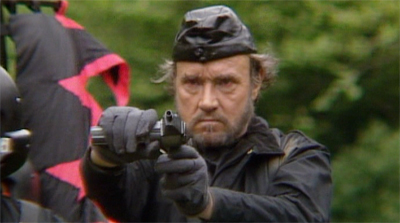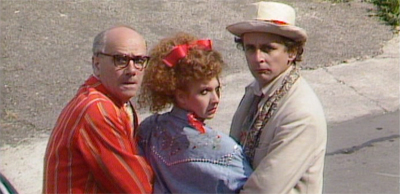To celebrate the fiftieth anniversary of the longest-running science-fiction show in the world, I’ll be taking weekly looks at some of my own personal favourite stories and arcs, from the old and new series, with a view to encapsulating the sublime, the clever and the fiendishly odd of the BBC’s Doctor Who.
Delta and the Bannermen originally aired in 1987.
Hey, this doesn’t look like Disneyland.
No, well, according to my reckoning, it seems to be somewhere in, er, Wales.
– Murray and the Doctor get in touch with the “real fifties”
Delta and the Bannermen is quite terrible. That said, it’s not terrible in the same way that, say, Timelash or Attack of the Cybermen or The Twin Dilemma is terrible. It doesn’t offer a demonstration of everything intrinsically wrong with this era of the show, and the frustration isn’t compounded by the sense that nobody producing the show seems interested in watching it and maybe learning from their mistakes.
While that is certainly a promising thing from the perspective of the show, it doesn’t really do the viewer that much good when they are watching it.
In a nut shell, Delta and the Bannermen suffers from the same problems that held Paradise Towers back from greatness. There’s a huge gulf between the concept and the execution. Delta and the Bannermen has a fairly solid core concept, but the execution is absolutely cringeworthy. You can see, quite clearly, what writer Malcolm Kohil was trying to do, only to make it increasingly frustrating as he misses his mark. That sense of dissatisfaction is compounded by the fact that nobody else involved has a clue what they’re doing.
Delta and the Bannermen is as experimental as Paradise Towers or Dragonfire, with a sense that script editor Andrew Cartmel and his team are trying to figure out how exactly they want to make an episode of Doctor Who. Experimentation is risky, and there’s a reason that so many promising young shows settle into a rut after solid first or second seasons. If you have a model of television that works reasonably well, there’s no point in shaking things up.
After all, every time you try to do something new or bold, you risk falling flat on your face. That’s how CSI went from a breath of fresh air in the police procedural genre to one of the most formulaic shows on the air. Doctor Who has a bit of luxury here. The old model was very clearly not working. The show had been pushed to the brink of cancellation using the existing model. So that means that the series had little choice but to experiment.
And there are some great ideas here. While it might have been a bit ambitious given the budget, it’s nice to see the opening scene strive for a fifties pulpy space opera kind of feel. Delta and the Bannerman is an affectionate throwback, a look back at a past which never really existed. It’s all as phony as the exaggerated American accent put on by American performer Stubby Kaye. It’s as fake as the toll booth operator played by Ken Dodd.
There’s a delightfully cheeky and playful feeling to some of the ideas here. I love the notion of “Nostalgia Tours” offering tourists a trip not only to a different place, but to a different time. The only problem is that sometimes you don’t end up in fifties Disneyland, you end up in fifties Wales. There’s a nice Douglas-Adams-esue sense of humour to all this, right down to the notion that bees know more about what’s going on than the characters.
Goofy is great. I love the absurd. I adore the idea of a toll booth in time and space, because it’s just so perfectly Doctor Who – an idea you’d never see anywhere but in quirky British science-fiction. The problem is that Delta and the Bannermen just can’t figure out what it wants to be or what it wants to do. It feels sort of cobbled together, with a rake of half-decent ideas pulling in a number of different directions and no clear sense of tone.
Of course, that makes sense. Delta and the Bannerman was a troubled script. Of course, at this point in the show’s history, “troubled script” is a relative term. All of the season was written in a hurry, but Delta and the Bannermen suffered because ideas were constantly being thrown out and replaced:
Everything for this season was done in a real hurry and I remember there was a major rewrite on Delta, like scrap all of episode two and write a new one. I remember going to Malcolm’s flat in Hampstead and we blocked out this story.
Throwing out the entire middle-act of the story and trying to rework it takes its toll. The biggest problem with Delta and the Bannermen is the disconnect between the core idea – homage to fifties sci-fi in a silly Welsh holiday camp! – and the execution.
Consider the character Gavrok, played by the wonderful Don Henderson. He basically wanders into what is initially pitched as a light comedy episode and starts killing all the comic relief. First he cold bloodedly executes Ken Dodd, and then he blows up a bus full of innocent space-tourists. You might expect this to serve as some sort of twist or sudden story shift. In a Russell T. Davies twist, it would call the Doctor out on his arrogance and his cavalier attitude. It might serve to raise the stakes for the audience – oh no, this story has consequences and casualties!
However, even the mass murder of civilians at the hands of a genocidal madman can’t quite change the mood of the story. Burton ends the story greeting the next tour bus as if nothing has happened. The only indication that mass-murder has taken place is the fact that he sent his staff away and thus has to handle the next bunch of tourists himself. It feels rather strange and surreal, with none of the human characters in the story seeming to miss a step with all the craziness going on.
Similarly, the love story is rather surreal. Billy doesn’t seem at all perturbed by the fact that he has just met an alien. When he walks in on Delta nursing a very clearly alien baby, he doesn’t seem the least bit fazed. Apparently Wales is a far more cosmopolitan place than I might have imagined. The inhabitants seem to react rather well the revelation that there are aliens from other worlds out there, and some of them want to kill us.
(Delta’s baby is another example of how surreal the story feels. One minute the baby is a creepy looking puppet. The next it’s a few-month-old baby dressed up as if it’s about to play a leaf in some kindergarten end-of-year show. Nobody seems to bat an eyelid about it, and the baby’s reactions to all the madness going on around it makes for an inadvertent highlight of an unsatisfying serial.)
What’s really surreal, then, is the sense that Sylvester McCoy has found his version of the Doctor. Amid all the off-tone comedy and the strange blend of genocidal aliens with pointless comic relief, McCoy actually has a pretty wonderful scene with Gavrok. As the later seasons demonstrated, McCoy excelled when given good material. (Watching him deliver Steven Moffat’s Stonehenge monologue from The Pandorica Opens is a geeky pleasure. It’s those “rrrr”s.)
We get to see the character’s outrage and disgust shining through as he admonishes Gavrok. “You promise life,” he observes, “but in the end it will be life which defeats you.” It’s a wonderful moment, because McCoy’s Doctor had been defined – up until that moment – as something of a trickster. This is the point where we see that he can hold his ground. Although he has his limitations. McCoy’s hesitant admission the he overplayed his hand (“actually, I think I may have gone a little too far”) is the episode’s comedic highlight.
To be fair, it’s also worth pointing out that Delta and the Bannermen manages to find the “sweet spot” for Mel as a companion. If you want an image of Mel at her most comfortable, it’s sitting on a bus full of alien tourists singing space rock-and-roll. Her chirpiness and enthusiasm fit right in, and her willingness to make Delta feel at home on this distant world feels genuine.
It’s a shame that the script doesn’t do too much with her after the first episode, and it’s a waste that the show seems to finally get a handle on her just before she leaves, but I can honestly say that Delta and the Bannermen is probably the only script from Bonnie Langford’s time on the show which wouldn’t work as well with another companion. The only catch is that it’s all relative – it might work better with Mel than with any other companion, but it’s still a bad piece of television.
Still, these are only minor highlights in what amounts to a very troubled episode. Delta and the Bannermen is a failure. I can’t even argue that it’s a noble failure, or a worthy failure. While Time and the Rani has the excuse of being cobbled together in order to get something on the air, Delta and the Bannermen has no real excuse. It’s the show’s first three-parter Planet of the Giants, but the format would seem easier to write than the standard four- or two-part episode.
You should, in theory, be able break the story acts up by episode. The first part is the introduction, the closing part the conclusion and the middle episode is the heart of the story. You’d imagine that breaking a story into three chunks would be somewhat more fluid than having to divide it over four. And yet Delta and the Bannermen feels terribly paced. It feels like the destruction of the bus should be climax of the second episode, with the third part getting a bit darker and pushing the Doctor a little bit.
Instead, we get a rather lame “let’s run to a motorbike” cliffhanger. It feels strange to make this criticism of the show’s first three-parter in so many years, but Delta and the Bannermen feels too long. It feels like it could easily have been tightened up or trimmed without losing anything especially essential.
Delta and the Bannermen is – quite frankly – a terrible episode of Doctor Who. There’s very little to redeem it, save a momentary highlight here or there, often feeling like a cast-off from a better episode. Still, the concept is sound, and it’s easy to see why it might have seemed like a good idea on paper. It’s just that Doctor Who hasn’t quite returned the point where it can transition from good ideas on paper to good ideas on screen just yet.
But we are getting there.
Filed under: Television | Tagged: Andrew Cartmel, art, Bannermen, bbc, Delta, Disneyland, doctor, DoctorWho, fiction, Ken Dodd, literature, Online Writing, Paradise Towers, russell t. davies, science fiction, Sylvester McCoy, Twin Dilemma |































Leave a comment